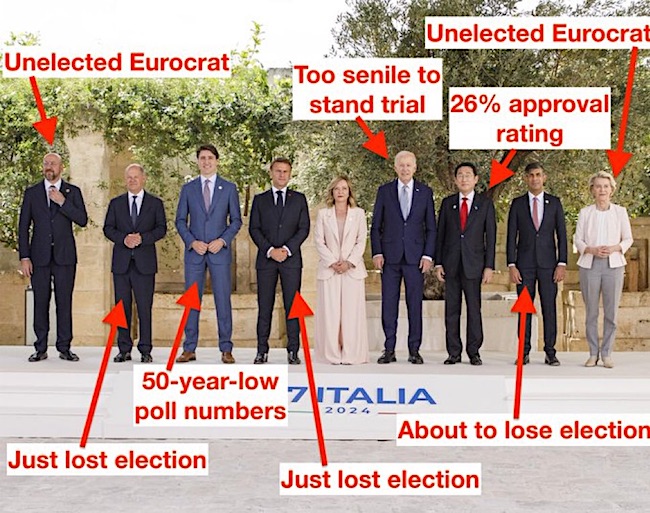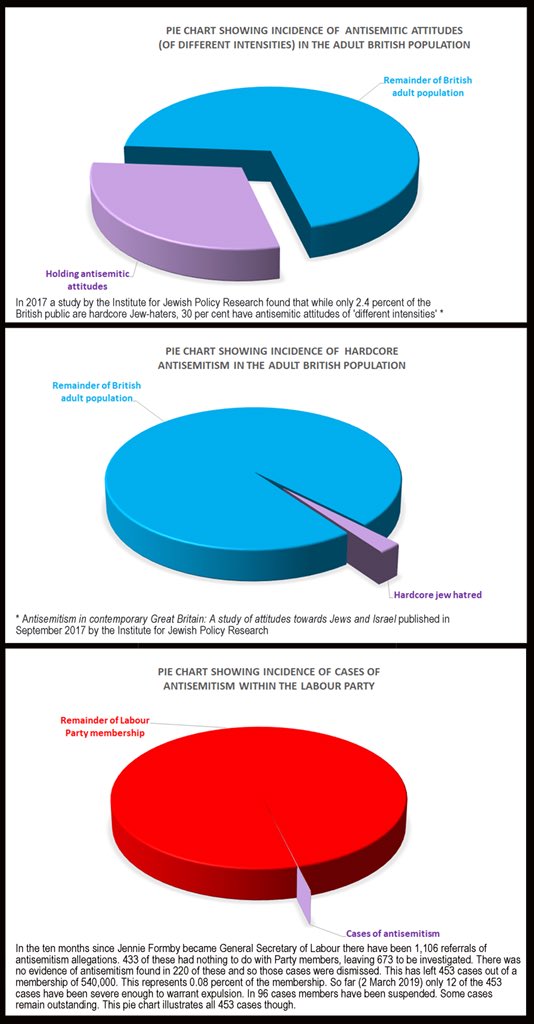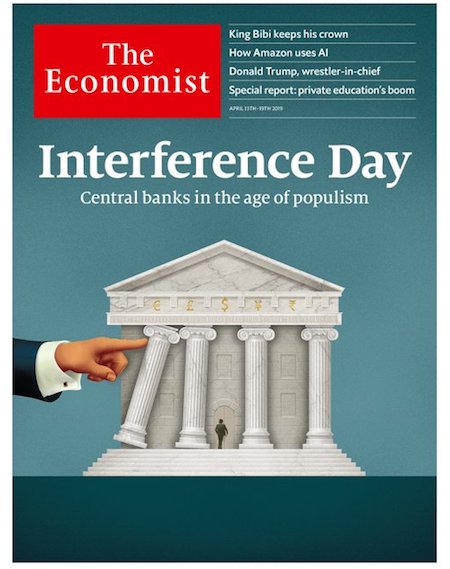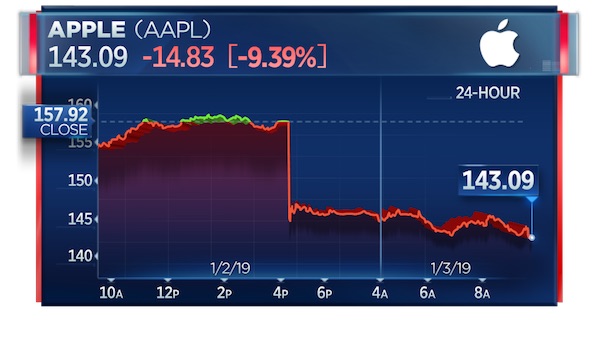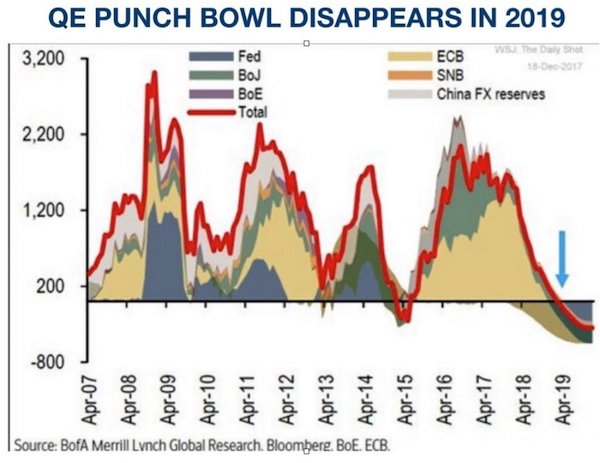
René Magritte The evening gown 1954



Not a convicted felon
https://twitter.com/i/status/1808583120234631350

Vivek
Many are celebrating like the race is over. The truth is it hasn’t really begun. pic.twitter.com/06DUoEXKRE
— Vivek Ramaswamy (@VivekGRamaswamy) July 4, 2024

Bannon
https://twitter.com/i/status/1808889208548835397

Tulsi Kamala
https://twitter.com/i/status/1808641698932699455

KJP
Is this a Saturday Night Live skit?
Reporter: “How is it possible that Joe Biden would suffer from ‘jet lag’ two weeks after he got back from his trip…?”
Karine Jean-Pierre: “It's the jet lag AND also the cold, right?”
— Steve Cortes (@CortesSteve) July 3, 2024


Yeah, debate night was a one-off. All’s fine now…
• Biden Says He Is Proud To Be A ‘Black Woman’ (RT)
US President Joe Biden has made several radio interview appearances and delivered a brief Fourth of July speech in an apparent attempt to reassure Democrat supporters about his mental capacity to serve following a disastrous debate with his Republican rival Donald Trump. Biden openly admitted he “screwed up” the debate with Trump, but told The Earl Ingram Show on Thursday that he will “get back up,” rejecting any intention of dropping out of the presidential race. “I had a bad night…. And the fact of the matter is that, you know, I screwed up,” Biden said bluntly, after his aides spent a week offering various excuses from an alleged preparation overload, to a minor cold and a jet lag from a trip 12 days ahead of the debate. During a separate interview with Philadelphia’s WURD, the gaffe-prone US leader struggled to find the right phrase while apparently trying to refer to Vice President Kamala Harris and recall his time in Barack Obama’s administration.
NEW: President Biden goes on incredibly confusing rant, calls himself the first black woman to serve with a black president.
He also called himself the “first president that got elected statewide in the state of Delaware, when I was a kid.”
“By the way, I'm proud to be the, as… pic.twitter.com/VMNtVe85Pz
— Collin Rugg (@CollinRugg) July 4, 2024
“By the way, I’m proud to be, as I said, the first vice president, first black woman… to serve with a black president. Proud to be involved of the first black woman on the Supreme Court. There’s so much that we can do because, look… we’re the United States of America,” Biden said. The US president also delivered a four-minute speech at the White House, focusing his remarks on his visit last month to Normandy, to commemorate the 80th anniversary of D-Day, but seemingly veered off script and lost the train of thought several times, and at one point even called his rival Trump a “colleague.” “And by the way, you know I was in that WWI cemetery in France, and…. the one that one of our colleagues, the former president, did not wanna go and be up there… I shouldn’t probably have said it anyway,” Biden said before abruptly cutting the story short, and continuing his prepared remarks.
DISGRACEFUL: A heavily slurring Biden starts to stumble through the debunked "suckers and losers" hoax at the White House Independence Day celebration — in front of our great military families pic.twitter.com/57O54Gt8zZ
— RNC Research (@RNCResearch) July 4, 2024
In another clip scrutinized and mocked by critics, Biden greeted the crowd with a lively “Ho! Ho! Ho! Happy Independence Day!”, after Harris almost accidentally introduced him as the vice president. Concerns over whether the 81-year-old veteran politician can successfully handle the presidential campaign and four more years in the Oval Office were reignited after Biden delivered a shaky performance in a televised debate with Trump last Thursday. The incumbent appeared frail and seemingly lost his train of thought on multiple occasions, allowing his rival to comfortably come out on top by most accounts. A post-debate Reuters/Ipsos poll found that one in three Democrats believe that Biden should quit, while some key donors have reportedly been looking at ways of replacing Biden with a stronger candidate on the 2024 ticket.

Big Mike.
• Michelle Obama Hears the Calls and Sees the Polls (Taft)
The latest stories are that Joe Biden has been given only a few more days to prove he should be the Democrat nominee for president after his disastrous debate performance. If he leaves the race, the thinking is that the only person who could swoop in at this late stage and defeat Donald Trump in November is Michelle Obama, not Kamala Harris. The speculation is not without merit according to a new poll. Kamala Harris is a better-known quantity. She’s held political office. She’s one of the least respected and worst vice presidents America has ever seen. After slipping into the San Francisco District Attorney’s Office under the, ah, tutelage of married Bay Area kingmaker Willie Brown, she won the race for California attorney general by highlighting her Indian background. She was awful. Eventually, when U.S. Senator Barbara Boxer, herself not a MENSA member, announced her retirement, Harris jumped into the race and defeated a fellow Democrat on a ballot that featured recreational pot use.

Harris sent people to prison for pot use during her stints as DA and attorney general. She changed her position when she ran for president. Harris is incapable of speaking extemporaneously. When she speaks, it’s with a nasally tone that invariably settles into lecture mode. Michelle Obama has never run for political office. She and her husband have had a general antipathy for America, “For the first time in my adult life I’m proud of my country,” for example. Michelle Obama’s unpopular overhaul of the school lunch program and government-paid food mobiles to address “food deserts” showed her willingness to ignore process and indulge her leftist authoritarian streak. An Ipsos poll released this week shows that Michelle Obama is better liked than Joe Biden and other potential candidates in the Democrat race. The poll question asked, “Would you say you are generally favorable or unfavorable towards these public figures?”
Michelle Obama, who’s never held elected office and has never wanted to run a campaign for one, is at 55 percent favorability. Joe Biden is at 36 percent with a 60 percent unfavorable rating. Biden is one point behind Vice President Kamala Harris. Former President Trump is at 39 percent favorability. On the question of whom they would vote if the choice is between Trump and Biden, the two tied. Michelle Obama is surely thrilled that some would think she is of presidential timber, but few people know if she could do the job. As Matt pointed out in a piece earlier this year, Obama has said multiple times she has no interest in being president.

“There’s zero chance,” Michelle Obama said back in 2019. “There are so many ways to improve this country and build a better world, and I keep doing plenty of them, from working with young people to helping families lead healthier lives. But sitting behind the desk in the Oval Office will never be one of them. It’s just not for me.” Her spokeswoman, Crystal Carson, said earlier this year that she’s not into it. “As former First Lady Michelle Obama has expressed several times over the years, she will not be running for president,” said Crystal Carson, director of communications for her office. “Mrs. Obama supports President Joe Biden and Vice President Kamala Harris’ re-election campaign.” And there’s this comment from a Netflix special Obama was a part of in which she said being president wasn’t in her “soul.” “[T]he people who get into it [politics]… you’ve got to want it. It’s got to be in your soul, because it is so important. It is not in my soul.”

That’s Barron in the cart with him?
• Trump Caught On Camera Insulting Biden (RT)
US presidential hopeful Donald Trump has declared that he trounced his “old, broken down” rival Joe Biden during their election debate last week, in a video released on Wednesday by The Daily Beast. In the footage Trump is sitting in a golf cart hurling insults at that 81-year-old incumbent president. He also claimed that Biden would withdraw his candidacy. ”How did I do with the debate the other night? I kicked that old, broken down pile of crap. He’s quitting the race,” Trump says, referring to Biden. Trump then went on to deliver a dig at US Vice President Kamala Harris, who is seen as a possible replacement candidate amid mounting calls for Biden to step aside. ”I got him [Biden] out the race, and that means we have Kamala. I think she’s going to be better [as an opponent]. She’s so bad. She’s so pathetic,” the former president said, then appearing to add: “She’s so f**king bad.”
https://twitter.com/i/status/1808879563075658060
He then switches back to Biden, asking, “Can you imagine that guy dealing with [Russian President Vladimir] Putin? And the president of China – who is a fierce person. He’s a fierce man, very tough guy.” “But they just announced he’s probably quitting. Just keep knocking him out, huh?” Trump reiterates, before driving off in the cart. It was not immediately clear where or when the footage was covertly filmed, The Daily Beast noted. The White House has stated that Biden is “absolutely not” considering ending his campaign. “He understands that it is fair for people to ask that question,” press secretary Karine Jean-Pierre told journalists on Wednesday. The Daily Beast said it had reached the Trump campaign for comment, and spokesperson Stephen Cheung directed the outlet to an earlier statement declaring the “Total Collapse of the Democrat Party.” “Every Democrat who is calling on Crooked Joe Biden to quit was once a supporter of Biden and his failed policies that lead to extreme inflation, an open border, and chaos at home and abroad,” according to the statement by Trump campaign senior advisers Chris LaCivita and Susie Wiles.

“.. I got him out of there. And that means we have Kamala. I think she’s going to be better. She’s so bad. She’s so pathetic. She’s just so f*****g bad..”
• Trump Wants Biden To Stay In Race – WaPo (RT)
Republican presidential frontrunner Donald Trump hopes that his rival, US President Joe Biden, will not withdraw his candidacy after his disastrous TV debate performance, the Washington Post has reported, citing anonymous sources According to the Post, Democrats have been “plunged into panic” over Biden’s “poor showing” at last week’s TV debate with Trump, questioning his ability “to execute the campaign or serve another four years,” and even seeking to replace him with someone else. While Trump and his campaign expect Biden to stay in the race they have begun preparing for the possibility of facing a different opponent, the Post reported on Thursday, citing “four people familiar with private discussions.” The Post has traditionally been hostile to Trump and close to the US Democrats. “It sure seems they want Biden to stay on the ticket,” David Axelrod, a long-time Democratic strategist, told the Post.
“They think he’s vulnerable, and they like where they’re at. You can see they are not excited at all about the prospect of him leaving the race.” Quotes from named Republicans don’t seem to support Axelrod’s claim, however. Taylor Budowich, head of the pro-Trump MAGA Inc. political action committee, told the Post that clips from last Thursday’s debate “would make for devastating campaign commercials” but that the possibility of Vice President Kamala Harris becoming the nominee “has the ad team cackling with excitement.” “We are confident no matter what that we will be victorious in tying any Democrat on the ballot to Biden and to the Democratic Party,” Trump campaign spokeswoman Karoline Leavitt told the outlet. Trump himself has said he would campaign “whether it’s him [Biden] or somebody else,” and that “nobody else is doing any better” in the polls, the Post noted, citing two of his radio interviews on Monday.
A video of Trump that made rounds on social media on Wednesday showed the former and possibly future US president declaring that he “kicked that old, broken down pile of crap” – meaning, Biden – in the debate.“He’s quitting the race. I got him out of there. And that means we have Kamala. I think she’s going to be better. She’s so bad. She’s so pathetic. She’s just so f*****g bad,” Trump says in the video, published by another traditionally hostile outlet, the Daily Beast. Meanwhile, the Post has reported that top Democrats have given Biden a “grim ultimatum” to either quickly prove he is fit to rule and run, or be replaced by someone else. Until last week, most US media outlets insisted that the 81-year-old Biden was “sharp as a tack” and perfectly fine. The debate hosted by CNN showed Americans otherwise. One senior Democrat told Politico that “no one expected this nosedive,” describing it as “bad on message, bad on substance, bad on counter-punching, bad on presentation, bad on non-verbals. There was no bright spot in this debate for him.”

“..They fear that the 81-year-old incumbent’s continued candidacy would lead to a Republican sweep of Washington and an unchecked Donald Trump presidency..”
• One Of Biggest Democratic Donors Says Biden Should Step Aside (TASS)
One of the Democratic Party’s biggest donors, Netflix co-founder Reed Hastings, urged US President Joe Biden to withdraw from the presidential race. “Biden needs to step aside to allow a vigorous Democratic leader to beat Trump and keep us safe and prosperous,” he told The New York Times. According to the report, Hastings was among the first donors to publicly speak about Biden, although many of them said privately that Biden should stop his campaign. Bloomberg reported earlier that dozens of Democratic MPs are set to sign a letter, demanding that Biden withdrew from the presidential race. They fear that the 81-year-old incumbent’s continued candidacy would lead to a Republican sweep of Washington and an unchecked Donald Trump presidency, the news agency wrote.
The first televised debates before current and former presidents took place in Atlanta on Thursday. Biden and Trump were prohibited from having speech points during the debates. According to a CNN express poll, two thirds of the viewers said that Trump won the debate.Previously, The Wall Street Journal reported that a panic sparked among the US Congressional Democrats over what they consider Biden’s unsuccessful performance at the debates. Some Dems hope to find a new candidate for the upcoming elections. The presidential elections in the United States will take place on November 5. Trump has already secured enough delegates’ votes to be nominated as the Republican presidential candidate. Biden, who runs for re-election, has secured enough Democratic votes. Their candidacies will be officially approved by their parties later this summer.

5 days to cure senility?
• Biden Has Five Days To Prove Himself – Top Donor (RT)
US President Joe Biden and his campaign have just a few days to prove the 81-year-old politician’s fitness to run for another term, a major Democratic Party donor has said. Charles Myers, the chair of Signum Global Advisors, believes Biden’s disastrous debate performance against Donald Trump has changed the race “fundamentally” and caused “panic” – not only among Democratic Party donors but office holders as well. House and Senate Democrats in particular fear the president’s weak showing will drag down their campaigns, and prominent figures are expected to publicly call on Biden to step aside in favor of another candidate, Myers told Bloomberg Surveillance on Wednesday. “I’m hearing the most pressure and much more panic [from elected Democrats] actually than amongst the donors,” he said.
A separate report by Bloomberg suggested that dozens of Democrats in Congress are considering signing an open letter to Biden urging him to suspend his campaign. The report did not name those allegedly considering such a move, but attributed the information to an anonymous “senior party official.” The Biden campaign has just a few days to demonstrate the president is up to the job amid mounting concern over his physical and mental condition. “I think we’re going to find out in the next four to five days whether the president is still in this race. I don’t think he’s got three weeks,” Myers stated.
On Wednesday, Biden said he was ready to continue his reelection campaign “to the end,” dismissing any possibility of calling it off. “Let me say this as clearly as I possibly can, as simply and straightforward as I can: I am running… no one’s pushing me out. I’m not leaving. I’m in this race to the end, and we’re going to win,” Biden said during a call with his campaign staffers. The White House has also dismissed rumors of Biden’s potential withdrawal, with spokeswoman Karine Jean-Pierre saying the US president remains “clear-eyed, and he is staying in the race.”

“As 80% of Voters Say Biden ‘Too Old'”
• Panicky White House Hits Post-Debate Damage Control Button (Sp.)
The White House is scrambling to insist that Joe Biden has “absolutely” no intention of dropping out as the Democratic nominee for the November race. The veteran Democrat seemed to be “clear-eyed” and committed to staying in the race, despite Wednesday’s media reports that suggested Biden had conceded to an ally that he was eyeing exiting the race. President Biden and his allies have called all hands on deck to figure out a scheme to “rebuild confidence” in the 81-year-old leader’s mental acuity, but it may be too late. That said, 80 percent of the nation’s voters are insisting that the Democrat is simply too old to run for a second term, according to a Wall Street Journal poll released on Wednesday. Furthermore, this figure has risen 7 points as compared to the Journal’s survey in February. The WSJ poll was conducted in the wake of Biden’s disastrous debate against Trump – his first of the 2024 election cycle.
The June 27 face-off turned out to be a huge flop for the 81-year-old contender. Biden’s performance was punctuated with cringeworthy freeze-ups and slip-ups, which sent Democrats into panic mode. Discussions on when Biden might hit the exit ramp and bow out due to medical reasons exploded across all corners of the US media landscape. Reports were also rampant that allies of the US Vice President were privately discussing scenarios of a Kamala Harris candidacy. First, Rep. Lloyd Doggett (D-Texas) urged Biden to drop out of the race on Tuesday, then Rep. Jim Clyburn (D-S.C.), revealed in an MSNBC interview that he would back Harris if Biden stepped down. A Wednesday report in the New York Times added fuel to the fire by claiming that Biden told a close ally he is wondering whether or not to stay in the election race.
As part of the scramble to undo the damage in the last 48 hours, Biden has:
• Phoned top Democrats in Congress on Tuesday and Wednesday, including House Democratic Leader Hakeem Jeffries, Senate Majority Leader Chuck Schumer, Jim Clyburn (D-S.C.), and Sen. Chris Coons (D-Del.), according to Politico.
• Reportedly met in private with over 20 Democratic governors on Wednesday evening to tell them he underwent a medical checkup after the debate and is fine.
• Unexpectedly joined a Zoom call with campaign and Democratic National Committee staff on Wednesday. “Let me say this as clearly as I possibly can — as simply and straightforward as I can: I am running … no one’s pushing me out. I’m not leaving. I’m in this race to the end and we’re going to win,” Politico cited Biden as saying during the call.Sen. Chris Coons (D., Del.), after speaking with Biden on Tuesday, said that the president was “determined to beat Donald Trump.” White House Press Secretary Karine Jean-Pierre rushed to tell reporters on Wednesday that Joe Biden “is clear-eyed and he is staying in the race.” But pressure is growing exponentially, with dozens of Democratic lawmakers reportedly mulling signing a letter demanding that Biden withdraw from the race, according to an unnamed senior party official.

“..a brief checkup by a White House physician in the days following the debate, which did not include any major tests..”
• Biden Told Governors He Had Medical Checkup – Politico
US President Joe Biden has told a group of Democratic governors that he underwent a medical checkup following his poor performance in last week’s election debate against Donald Trump, Politico has reported, citing anonymous sources. During the CNN-hosted faceoff with his Republican rival last Thursday, the 81-year-old Biden appeared frail and seemingly lost his train of thought on multiple occasions. Most commentators, both Republican and Democrat, have concluded that Trump came out comfortably on top in the meeting, which was the first of two planned debates ahead of the November 5 presidential vote. One survey has also indicated that 72% of registered voters do not believe that Biden has the “mental and cognitive health necessary to serve as president.”
In the wake of Biden’s poor showing, multiple US media outlets have claimed there is growing pressure from within the Democratic Party and among major donors for him to drop out of the election race. Politico reported on Wednesday that the US president had held an hour-long private meeting with more than 20 Democratic governors earlier in the day, during which he mentioned a recent medical checkup after being asked about his physical condition. Politico quoted an unnamed person familiar with Biden’s schedule as clarifying that he was referring to a brief checkup by a White House physician in the days following the debate, which did not include any major tests. Biden is said to have told the governors that he was deemed to be in good health after the medical check. During the meeting with governors, the Democratic hopeful also reportedly reiterated that he would not be pushed out of the race, insisting that he was “in it to win it.”
Biden put his poor performance in the debate down to his failure to ease up with his schedule ahead of the faceoff with Trump, as quoted by Politico. Earlier, his campaign had attributed his underwhelming showing to a cold. Also on Wednesday, Bloomberg cited an anonymous “senior party official” as claiming that dozens of Democrats in the US Congress are considering a letter to demand that Biden suspend his reelection campaign. They are allegedly concerned that his weak candidacy could lead to a “Republican sweep of Washington and an unchecked Donald Trump presidency.” In the wake of last week’s debate, multiple liberal-leaning media outlets have openly called on Biden to step aside.

“Journalists need to be overt and candid advocates for social justice, and it’s hard to do that under the constraints of objectivity.”
• MSM Blames Right For Failure To Disclose Biden’s Infirmity (Turley)
On MSNBC, Joe Scarborough stated “start your tape right now because I’m about to tell you the truth. And F— you if you can’t handle the truth. This version of Biden intellectually, analytically, is the best Biden ever. Not a close second. And I have known him for years…If it weren’t the truth I wouldn’t say it.” Then the presidential debate happened and, after years of being protected by staff, tens of millions of people watched the president struggle to stay focused and responsive. So, as an embarrassed press struggled to explain the most recent belated disclosure, the reason is the “right-wing press” and the need to counter their narratives. While saying that reporters “are now expressing regret,” CNN explains that “some members of the White House press corps who have regular exposure to President Biden are now admitting they were “turned off” from exposing his mental decline before last week’s debate in part because of the attention it has got from ‘right-wing media.’”
It was just part of shaping the news, which is now the priority in journalism. A recent series of interviews with over 75 media leaders by Leonard Downie Jr., former Washington Post executive editor, and Andrew Heyward, former CBS News president, reaffirmed this shift. As Emilio Garcia-Ruiz, editor-in-chief at the San Francisco Chronicle, stated: “Objectivity has got to go.” But that objectivity seems to depend heavily upon what ideology you are advocating. We have been discussing the rise of advocacy journalism and the rejection of objectivity in journalism schools. Writers, editors, commentators, and academics have embraced rising calls for censorship and speech controls, including President-elect Joe Biden and his key advisers. This movement includes academics rejecting the very concept of objectivity in journalism in favor of open advocacy. In an interview with The Stanford Daily, Stanford journalism professor, Ted Glasser, insisted that journalism needed to “free itself from this notion of objectivity to develop a sense of social justice.”
He rejected the notion that journalism is based on objectivity and said that he views “journalists as activists because journalism at its best — and indeed history at its best — is all about morality.” Thus, “Journalists need to be overt and candid advocates for social justice, and it’s hard to do that under the constraints of objectivity.” Lauren Wolfe, the fired freelance editor for the New York Times, has not only gone public to defend her pro-Biden tweet but published a piece titled “I’m a Biased Journalist and I’m Okay With That.” Former New York Times writer (and now Howard University Journalism Professor) Nikole Hannah-Jones is a leading voice for advocacy journalism. Indeed, Hannah-Jones has declared “all journalism is activism.” The problem comes with these little embarrassing moments when the public suddenly sees that prior coverage was false.
Whether it is the Russian collusion story (for which reporters received Pulitzer Prizes) or the Hunter Biden laptop or the Lafayette Park photo shoot or the migrant whipping controversy, there is an inescapable pattern of omission and misdirection. This is why media outlets are collapsing as the public seeks other sources for information. As I previously wrote, the mantra “Let’s Go Brandon!” was embraced by millions as a criticism as much of the media as President Biden. It derives from an Oct. 2 interview with race-car driver Brandon Brown after he won his first NASCAR Xfinity Series race. During the interview, NBC reporter Kelli Stavast’s questions were drowned out by loud-and-clear chants of “F*** Joe Biden.” Stavast quickly and inexplicably declared, “You can hear the chants from the crowd, ‘Let’s go, Brandon!’” So, in expressing guilt for not pursuing the President’s mental and physical decline, the media is left with explaining that they are just doing what they are trained to do in the new J Schools. They were countering conservatives and framing the news.
This is why Washington Post publisher and CEO William Lewis is under attack for dropping a truth bomb on the staff of the Post when he told them: “We are going to turn this thing around, but let’s not sugarcoat it. It needs turning around,” Lewis said. “We are losing large amounts of money. Your audience has halved in recent years. People are not reading your stuff. Right. I can’t sugarcoat it anymore.” Staff is now trying to get him fired.

“..the US leadership is blind to the true state of affairs, as it has become “entangled in its own networks of intrigue and sanctions..”
• US Encouraging Ukraine To Commit New Crimes – Moscow (RT)
The US is nudging Ukraine towards committing new war crimes and helping to prolong the conflict by continuing to send military aid to the embattled country, Moscow’s ambassador to Washington, Anatoly Antonov, has said. On Wednesday, the administration of US President Joe Biden announced another military assistance package for Kiev totaling around $2.5 billion. It includes air defense munitions, HIMARS missiles, artillery rounds, anti-tank weapons and other equipment. Since the start of the conflict in February 2022, the Biden administration has committed more than $53 billion in military aid to Ukraine. In a statement on Telegram, Antonov denounced the latest American aid package, charging that Washington “continues its course towards war” and “harbors illusory dreams of a strategic victory over Russia.”
“Pumping up the agonizing Zelensky regime with deadly weapons is a futile project. In essence, this is encouraging Kiev terrorists to commit new crimes.” American weapons will not deter Russia from pushing on toward its end goal of “liberating Ukraine,” the envoy said. “They will only lead to new casualties among civilians, including women and children.” He also said that the Ukraine conflict mostly benefits the US defense industrial complex, while Washington “is balancing on the brink of conflict with Russia, the largest nuclear power.” The ambassador added that “it feels as if they are not thinking about the global consequences of the catastrophe that is approaching due to the short-sighted and dangerous policies of Washington.”
In addition, Antonov opined that by approving Ukraine aid, US policymakers intend to “demonstrate that they are steadfast in defending the crumbling world order based on American rules on the eve of the NATO summit in Washington.” Those politicians, however, are ignoring “the cost of such a Pyrrhic victory,” he stated. The ambassador said that the US leadership is blind to the true state of affairs, as it has become “entangled in its own networks of intrigue and sanctions” which have failed to deter Russia and other independent states, while becoming a burden for the West. The envoy also recalled that the West rejected Moscow’s peace overture that could put an end to the conflict. Last month, Russian President Vladimir Putin said that Moscow was ready to immediately open peace talks with Ukraine once it withdraws troops from Donbass and two other former regions and agrees to commit to a neutral status.

She delivers.
• Transformation of Russian Economy Is Marathon With Barriers – Nabiullina (TASS)
Current transformation of the Russian economy is a marathon race with barriers and not a short distance, Governor of the Bank of Russia Elvira Nabiullina said. “We have recovered quickly, quicker than we expected ourselves, than expected by many. Growth rates are very high in 2023. Growth rates are high now and certainly, everybody wants to keep them. However, it seems to me that it is important for us to comprehend the current situation and understand that this is a long-distance run. This is not a short run but indeed a marathon distance, and furthermore, across the country and with barriers. We therefore need to estimate forces and understand how we work with constraints,” she said. It is important to think how to respond to long-term challenges, Nabiullina noted. “Mere crisis response measures and the use of reserves should not be the response to such permanent structural change of the economy. This is rethinking of priorities, from my point of view, and reallocation of resources,” she added.

No peace!
• Concern Over Reports Of Orban Planning Moscow Trip (BBC)
Other EU leaders have expressed concern over media reports that Hungarian Prime Minister Viktor Orban may be meeting Russian President Vladimir Putin in Moscow on Friday. Mr Orban – whose country now holds the EU rotating presidency – is the bloc’s only head of national government to have kept close ties to the Kremlin following its full-scale invasion of Ukraine in 2022. European Council President Charles Michel said Mr Orban had “no mandate to engage with Russia on behalf of the EU”, while Polish PM Donald Tusk asked for clarification. Several media outlets reported about Mr Orban’s apparent forthcoming visit, quoting their sources. The Financial Times said one Hungarian and two EU officials had confirmed media reports that Mr Orban would meet Russia’s president on Friday. Radio Free Europe/Radio Liberty, a US-government funded media organisation, quoted a Hungarian government source. It also said that Hungarian Foreign Minister Peter Szijjarto would accompany Mr Orban.
.
On Monday, according to AFP news agency, Mr Orban promised “surprising news from surprising places”. In a post on X, Mr Michel wrote: “The EU rotating presidency has no mandate to engage with Russia on behalf of the EU. “The European Council is clear: Russia is the aggressor, Ukraine is the victim. No discussions about Ukraine can take place without Ukraine.” Mr Tusk asked: “The rumours about your visit to Moscow cannot be true@PM_ViktorOrban, or can they?” Earlier this week, Mr Orban visited Kyiv, saying a “a quick ceasefire could be used to speed up peace negotiations”. Ukrainian President Volodymyr Zelensky – who has had frosty relations with Mr Orban – did not publicly respond to the proposal. But many Ukrainians believe any ceasefire would simply cement Russia’s hold over territory it has seized from Ukraine and, if negotiations were to take place, they would prefer them to be conducted from a position of strength rather than on the back foot.Media speculation about Mr Orban’s visit to Moscow came as President Putin said again that he was open to negotiating with Kyiv. The Kremlin leader recently publicly voiced a number of tough pre-conditions for such talks but Kyiv and its Western allies say these are tantamount to Ukraine’s capitulation. Mr Orban has been a vocal critic of Western support for Ukraine. He previously slowed agreement on a €50bn ($54bn; £42bn) EU aid package designed to support Ukraine in its defence against Russia. Tuesday’s visit to Kyiv was his first in 12 years, although he met Mr Putin repeatedly during that time. During Mr Orban’s joint appearance with Mr Zelensky the body language between them was not warm, and neither took questions from the media after they gave their statements. But for the next six months Mr Orban’s position as head of the European Council means he has an influential role as a figurehead for Europe. He came to Ukraine on his second day in that role for discussions, saying there was a need to solve previous disagreements and focus on the future.

Labour: 410 seats. Tories: 131 seats. For a majority of about 170 seats. Not a typo.
• Labour Set For Crushing 170 Seat Majority In UK General Election (ZH)
The year of record elections continues to serve up dramatic results, and on Thursday, a national exit poll in the UK general election indicated that Rishi Sunak’s Conservatives will crash out of office after 14 years after Keir Starmer’s Labour party was heading for a massive majority of about 170 seats. The poll on Thursday night suggested Starmer will become prime minister with 410 seats out of 650 in the House of Commons, while Sunak’s party is facing the worst result in its history, with just 131 seats. The result, according to the FT, is “momentous for Britain and will resonate around the world” because at a time when right-wing populists are advancing in many countries, political power in the UK has swung back to a liberal, internationalist, centre-left party. But Labour’s victory was projected to be delivered on a smaller share of the vote than the 40% secured by leftwing Labour leader Jeremy Corbyn in his 2017 general election defeat — suggesting the public remains sceptical.
Labour’s shadow foreign secretary David Lammy warned: “If we do not deliver for working people, we will be out and nationalists will be on our tails.” He added: “That’s the lesson we have seen around the world.” Meanwhile, Nigel Farage’s Reform UK was projected to do better than expected with 13 seats, a result that would be a big breakthrough for his right-wing populist party. The first two constituencies to report results on Thursday evening, both in the north of England, showed Labour wins with Reform in second place. Labour’s victory is a personal triumph for Starmer, who took over the party’s leadership in 2020 after the party’s worst election defeat in almost a century. His projected victory is similar in scale to Sir Tony Blair’s 1997 Labour landslide. That said, while the Ipsos exit poll is usually a reliable predictor of overall results, the final result may still differ. Vote counts from individual constituencies will trickle in through the night, with Labour, if the polls are correct, likely to have a clear majority by 5am.
According to the exit survey, the centrist Liberal Democrats was on course to win 61 seats, close to the 62-seat record set by the party in 2005. The Lib Dems are forecast to make big gains in the Tory “blue wall” of rich constituencies in the south of England. The Scottish National party was set to come behind Labour in Scotland with just 10 seats, according to the exit poll, putting a serious dent in the party’s dream of securing independence. The survey exposed the overwhelming sentiment reported by candidates from all parties that Britain wanted “change”, with many senior Tories admitting during the campaign that the party looked exhausted. The UK has been under Conservative rule for 14 years, during which time there have been five prime ministers, with a near catastrophic banking and bond market crisis erupting during the brief reign of Liz Truss. The period was marked by economic austerity, Brexit, the coronavirus pandemic and an energy price shock.
Former Tory minister Sir Jacob Rees-Mogg said it was “clearly a terrible night” and added that the Conservatives had taken votes for granted. Starmer is set to become only the seventh Labour prime minister in the party’s history, and his victory is the first since 2005 for the center-left party. Labour last ousted the Tories from power in 1997, when Tony Blair became prime minister in a crushing victory over John Major’s Tories. He will move into 10 Downing Street on Friday and immediately form his cabinet, with an instruction to ministers to quickly deliver policies to jolt Britain out of its low-growth torpor. The exit poll indicated that Starmer’s avowedly pro-growth, pro-business agenda has paid off, as Labour bucked international political trends. Far-right parties have performed strongly in recent elections for the European and French parliaments, while in the US, Donald Trump is leading in polls for the presidential race.
Labour’s chancellor-in-waiting Rachel Reeves has said she hopes investors will now see the UK as a “safe haven” although once the UK unleashes the next spending spree to fund all the various welfare projects, we fully expect another quick funding crisis and even more QE.




Kirsch
Steve Kirsch: "The vaccines have killed massive numbers of people, about 1 in 1000, which means the vaccines have killed 675,000 people in America and about 13 million people worldwide….effectively 13 million people were killed by their governments worldwide…"
Source: The… pic.twitter.com/3jflVHDC5E— Camus (@newstart_2024) July 3, 2024

Bed making
Among the most unusual competitions, the bed making contest, held in China, is possibly at the top of the listpic.twitter.com/8fuJpoPaFx
— Massimo (@Rainmaker1973) July 4, 2024



Wolf
https://twitter.com/i/status/1808734618868461811

Jack
This is Jack. He accidentally opened his front-facing camera. Needs some help flipping this thing back around. 14/10 would lend a thumb immediately pic.twitter.com/M4M5GZ4J1G
— WeRateDogs (@dog_rates) July 3, 2024

Barn cat
https://twitter.com/i/status/1808746085415813126

Foxes
https://twitter.com/i/status/1808780625970606151

Penguins
https://twitter.com/i/status/1808739929469468689


Support the Automatic Earth in wartime with Paypal, Bitcoin and Patreon.










